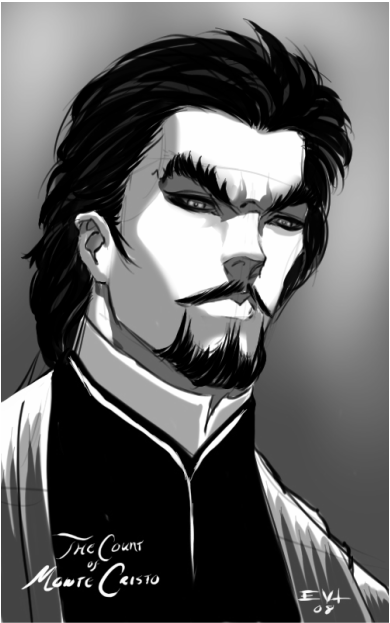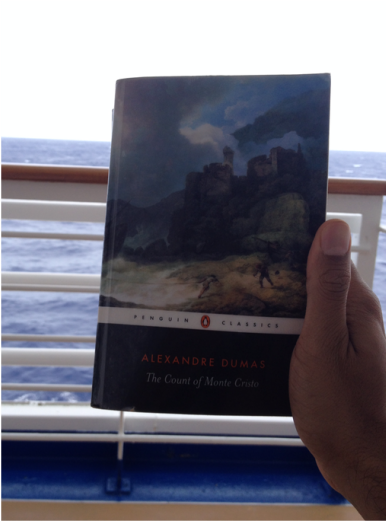First published in 1844, Alexandre Dumas' The Count of Monte Cristo was written as a serial publication with new chapters being released as a television series would run similarly today. People would anxiously await each chapter in between releases (there are 117).
The book deals with such concepts as class discrimination, revenge, faith, and salvation. Dumas, himself the grandchild of Haitian and French Ancestry, most likely felt the keen sting of racial discrimination as well as having experienced the political tumult of various french revolutions.
The story begins with our protagonist, Edmond Dantès, a young "every-man" (in his early 20's) who served as second mate on the merchant ship, The Pharaon. He has returned home from a long sea voyage and is eager to see his father and betrothed, the beautiful Mercédès. Mercédès belongs to the Catalan fishing community of Spanish immigrants who settled in Marseilles, France. Mercédès' cousin, Fernand Mondego, is madly in love with her and despises her and Edmond's relationship as, "it is a sacred law among the Catalans only to marry among themselves". He is further embittered when Edmond returns with news of his imminent promotion to ship captain. While Mercédès and Edmond celebrate their good fortune, those jealous of their happiness sit and conspire to rob Dantès of his future.
During his engagement party, Dantès is arrested by French Gendarmes in front of his peers, fiance, father and employer. He is subjected to shame and falsely accused of treason, which eventually lands him imprisoned in the formidable Château d'If. His loved ones inquire about his incarceration, but after several attempts to plead with the corrupt courts they are told that Dantès has been executed as they give up hope. Mercédès mourns for a year, Dantès Sr. slowly dies in poverty and from starvation due to a broken heart, while Msr. Morrell (Dantès' employer) suffers catastrophic business setbacks that nearly bankrupt his family. Dantès' conspirators, include Mondego (who later marries Mercédès), his ship mate Danglars (whose avarice, greed, and cunning allow him to succeed in business and amass wealth), Caderrouse (a covetous and opportunistic neighbor), and Villefort (a corrupt and ambitious politician bent on his own political gain).
Meanwhile, Dantès nearly loses his mind in captivity. After six years, he begins to lose faith in freedom. In a desperate attempt to escape through suicide he refuses to eat hoping that starvation will give him peace. As he waits for a slow and painful death, Dantès hears the scratches of a fellow prisoner secretly tunneling into his cell. Here, Dantès meets his fellow inmate, Abbé Faria, an ingenious priest who convinces Dantès not to give up and that together they can aspire for freedom. For the first time in years, both of them have found companionship as Dantès finds a surrogate father, and the Abbé, a son. Over the next eight years, the Abbé mentors Dantès and spends time teaching him multiple languages, maths, sciences, economics, and philosophy "which cannot be taught".
"Philosophy is the union of all acquired knowledge and the genius that applies it: philosophy is the shining cloud upon which Christ set His foot to go up into heaven."
― Abbé Faria
The Abbé even helps Dantès to solve the mystery of his imprisonment and laments, "Because I have insinuated a feeling into your heart that was not previously there: the desire for revenge" which sets the wheels in motion for the transfiguration of mortal Dantès into the supernatural Count of Monte Cristo.
Abbé Faria suffers from epileptic seizures and just before his death he bequeaths Dantès with the secret whereabouts of a tremendous fortune located on the Isle of Monte Cristo.
When the prison guards discover the corpse of the Abbé, they sew him in a muslin body bag and leave the cell to make further preparations. Here after nearly 14yrs of imprisonment, Dantès takes advantage of his opportunity to exchange places with the deceased in order to escape and later on dig himself free from his burial; however he learns that instead of being buried, deceased inmates are thrown into the sea with weights chained to their body. Dantès is thrown into the ocean and must fight to survive by breaking himself free from his chains and tearing through the burial sack all while swimming to the surface for breath. He accomplishes this metaphorical "birth" from prisoner to free man and falls into company with a pirate vessel coasting along the shore. Being an accomplished sailor, Dantès is quickly respected by the men and begins his quest to find out the status of his family, friends, and enemies.
This book has been celebrated for generations and shares honors for being one of the quintessential readings for young men as they develop their own character in life. Dumas has created a masterpiece that is as amazing in translation as it must surely have been in its original french.
I set out on a three week trip to Europe with this book as my sole entertainment and was not let down as I devoured nearly 100 pages a day. It is beautifully constructed with many side stories as well. It delivers many lessons and leaves the reader encouraged to seek their own freedom from false imprisonment. It touches upon the nature of men and women. It discusses the conduct of politics. It examines the psychology of revenge. It challenges the reader to explore faith and fidelity.
One of the underlying subplots of the novel is the concept of treason and its implications on those who are faithful to either "the King" or "the Emperor". The story takes place during the french revolution where corrupt wealthy elites by royal birthright were removed from office through force and replaced with Napoleon, a military general turned emperor, whose own power is usurped back by the Royalist party. It was a struggle for power and dominion not unlike a spiritual war, which I think Dumas cleverly suggests to the reader.
It seemed to ask the question, "To which Authority does one serve?" Depending on how one answers, they will find themselves rewarded for their loyalty or be found guilty of "treason".
Upon landing back on shore from his time as a smuggler, Edmond visits a barber to see if he would recognize his own face. "The Barber looked with astonishment at this man, with his long hair and thick black beard... and was surprised that a man who could enjoy such physical attributes should deprive himself of them." After discovering that people no longer recognized him as Edmond Dantès upon his return to Marseilles, he dawns his new persona as the Count of Monte Cristo (along with a few other aliases: Sinbad the Sailor, Abbé Busoni, and Lord Wilmore). Using the hidden fortune left to him by his adopted father, Abbé Faria. The Count spends several years traveling the Earth acquiring new knowledge and skills to help him exact revenge on his enemies. He perfects many languages and makes numerous alliances with people of influence. He saves lives, and helps the less fortunate. He becomes a "Guardian Angel" to those who loved him before and during his exile. He becomes an "Avenging Angel" to those who betrayed him and were disloyal.
The Count makes his return to France in a grand fashion as he quickly becomes the talk of Paris with his wealth and eccentricities, "either because of some imagined aura or because of his natural presence, he attracted attention wherever he went." He studies his enemies and learns of their strengths and weaknesses, even going so far as to make the acquaintance and gain the trust of his enemies' grown children. He constructs an incredible plot spanning years to use his enemies' own flaws against themselves until they have suffered as he was condemned to do. The Count offers them opportunities for redemption, but knows their nature won't elect this path.
Slowly, one by one the Count's betrayers are destroyed as the secrets of their past come back to haunt them. Some kill themselves, others leave their lives in shambles. Only when a the young son of Villefort, the corrupt politician, is killed by his own demented and murderous mother does the Count realize that he has gone too far. He tries to revive the boy, but he is too late.
"for the Lord loves what is right and does not abandon his faithful people. He protects them forever, but the descendants of the wicked will be driven out."
― Psalm 37:28
The Count compares himself to the fallen angel who thought himself the equal of God and repents by saving the life of another who was poisoned by the murderous step mother as he raises her from the dead.
"Come, do you know what the Count of Monte Cristo can do? Do you know that he commands many powers on earth? Do you know that he has enough faith in God to obtain miracles from Him who said that if a man has faith he can move mountains?"
After revealing his brilliant plan to restore the "dead" woman back to life, the Count leaves his wealth in the hands of a family friend and sails off into the sunset with his devoted new paramour, Haydée, concealing his final words in a letter.
"Live, then, and be happy, beloved children of my heart, and never forget, that until the day God will deign to reveal the future to man, all human wisdom is contained in these two words, 'Wait and Hope.”
― Alexandre Dumas





 RSS Feed
RSS Feed
